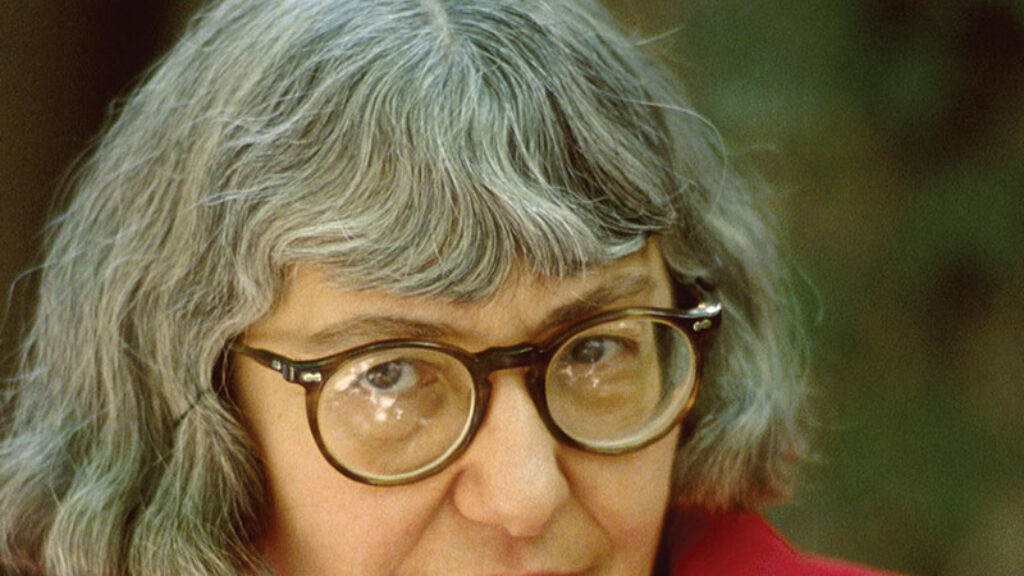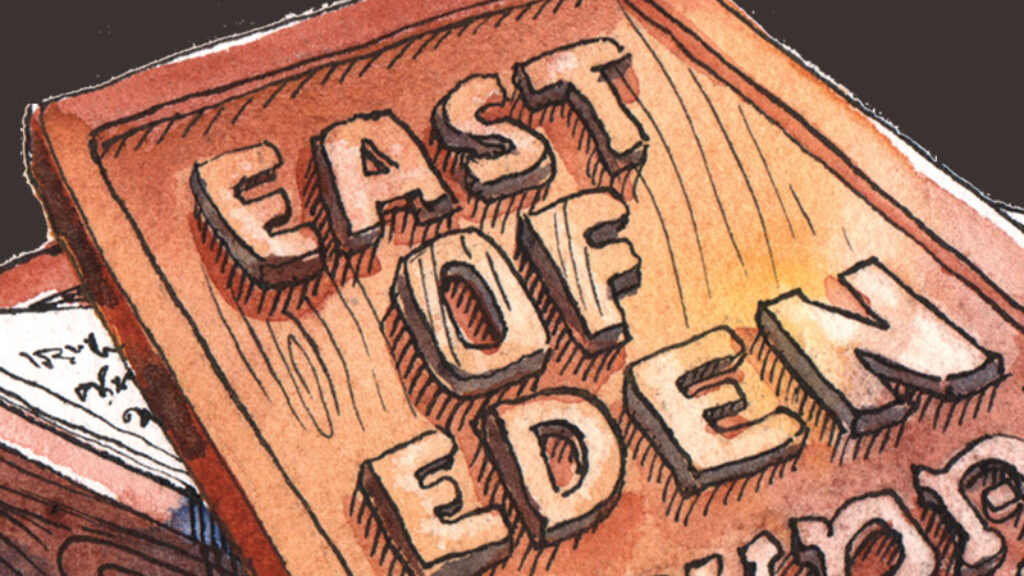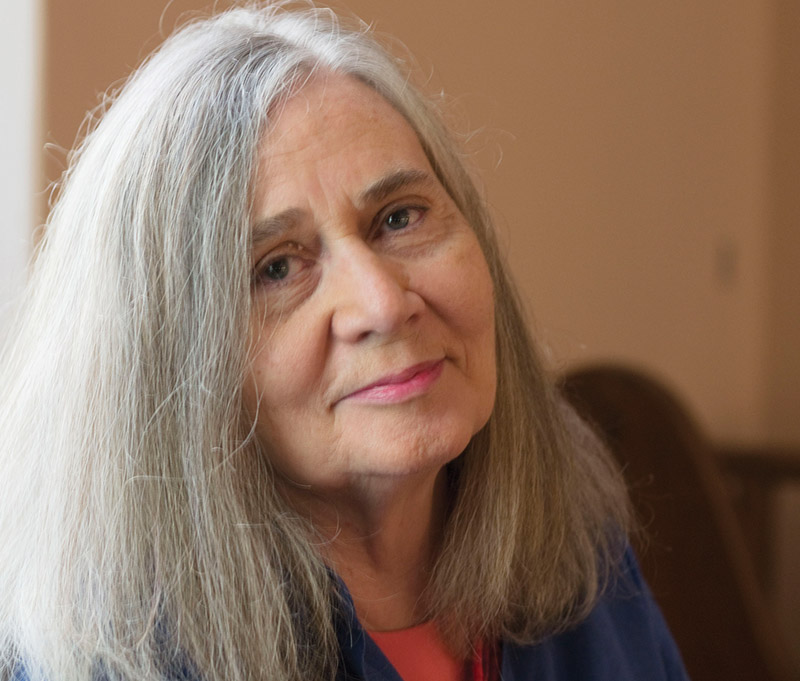Light and Darkness
Marilynne Robinson’s God makes surprising sense.
Not that her conception of God is simple. Long before Robinson published her new commentary of the book of Genesis, she and her characters were mindful of its unpredictable God. Early in her magnificent novel Gilead, for instance, the old preacher John Ames recalls a harrowing journey he took with his father through Kansas in 1892, in the midst of a drought, to find his grandfather’s grave:
There were times when I truly believed we might just wander off and die. Once when my father was gathering sticks for firewood into my arms, he said we were like Abraham and Isaac on the way to Mount Moriah. I’d thought as much myself.
Later in the book, Ames warns his own son against proofs of the biblical God: “They’re always a little impertinent, I think, because they claim for God a place within our conceptual grasp.” Now after the three stunning, Bible-soaked novels that follow Gilead,Robinson has given us her reflections on Genesis.
A devout reader of Calvin, and doubtless the sole instructor at the Iowa Writers’ Workshop who also gave Bible classes at a local church on Sunday, Robinson now gives us a picture of a God of grace that both illuminates and sometimes sits uncomfortably with the book of Genesis. For instance, after human beings try to storm the heavens at the Tower of Babel, God confuses their language, but, Robinson writes, “nothing is done to disable humankind or to deprive them of the brilliance and knowledge that make them ‘like one of us.’ The obstacles God sets to His Adam’s strange grandeur are external. This is consistent with His unvarying loyalty to His creature.”
God’s fidelity is strong and constant, and God’s forgiveness, in Robinson’s reading, is a testimony to the Deity’s deep attachment to the frail and fallible products of his work.Throughout Genesis, Robinson sees sparks of God’s goodness and grace. The book serves to “trace the workings of God’s loyalty to humankind through disgrace and failure and even crime.” Yet even in Genesis, and far more in later books of the Torah, discordances shudder through the text. There is the loving God but also the awesome and uncanny God. There is the Shabbat God, so to speak, but also the God of Yom Kippur.
“The book of Genesis” Robinson writes, “is framed by two stories of remarkable forgiveness, of Cain by the Lord, and of his ten brothers by Joseph.” Her remark reminded me of a teaching in the Talmud from Rabbi Simlai:
The Torah begins with an act of kindness and ends with an act of kindness. It begins with God clothing the naked: “The Lord God made for Adam and his wife garments of skin and clothed them,” and it ends with Him caring for the dead: “And He [God] buried [Moses] in the Valley.” (Sotah 14a)
Setting aside, for the moment, that Rabbi Simlai was talking about the entire Torah, and Robinson is restricting herself to the book of Genesis, their framings reveal different approaches to the Bible. Adam must still leave the garden, but he will not do so naked; Moses must still die on the mountain, but he will receive what the rabbinic tradition calls the “true kindness” of a burial. Neither is forgiven their sins, and they must pay their consequences. The dictates of justice endure, albeit administered with a tender hand.
Rabbi Simlai might well say the same about the fate of Cain: Was the verdict of a life of wandering an act of forgiveness, as Robinson would have it, or one kind of leniency? As for Joseph, did he really forgive his brothers in the end? The Bible at least leaves the question open. But Robinson’s reading of this book is deeply Christian, and the idea of grace as forgiveness unearned but freely given is central to her reading of Genesis. Near the outset of her exploration, Robinson tells us, “Grace modifies law. Law cannot limit grace.” And when it comes to the brothers’ distrust of Joseph, she beautifully explains, “Grace, being apart from the calculus of deserving, is often suspect.” Joseph’s brothers cannot trust because they do not understand the workings of grace. The inexplicability of Rabbi Simlai’s God, the God of the Rabbis, is somewhat different.
There is an interesting passage in which Robinson speaks of human power and says, “We are never properly in awe of it.” In an age of AI, we can certainly accede to this. Yet it seems to me that by contrast, Robinson’s book is never fully in awe of God. By this I don’t mean to impute anything blasphemous or heretical. Hers is the biblical God of creation and redemption to be sure. But it is also the good God who made a good creation and has a benign intention for humanity. The early chapters of Genesis, she writes, establish a “profound and essential assertion of the sacred good, making pangs and toil a secondary reality.”
Yet the God of Genesis and the biblical books that follow is not only, or merely, good and loving. God is frightening, a battling God, engaged in and intertwined with dark forces that peek through the veil of creation. It is not the fallenness of man as much as the brokenness of the universe that portends evil in our world, a biblical thought that kabbalistic traditions would later make metaphysical.
Robinson is not entirely at ease with this unpredictable Being. She writes that the Abrahamic “covenant between the pieces” has “the quality of an archaic ritual.” Indeed it does, but it also reveals the overwhelming and truly terrifying aspect of a God who can neither be manipulated nor known. In the King James Version, which Robinson prefers (and helpfully appends at the end of her book), we are told that after taking the prescribed animals, splitting them in equal pieces, and laying them on the ground, night fell, and “a deep sleep fell upon Abram; and, lo, an horror of great darkness fell upon him” (Gen. 15:12).
We tend to tamp down these eruptions of evil forces (all those adorable arks with animals—no depictions of corpses floating in the water). The biblical God has a plan beyond the ken of human beings, as Robinson rightly says. But there is more than mystery: a primordial terror sweeps through the text, the substratum of darkness in creation that is not a consequence of Adam and Eve’s sin but of the nature of reality. The Sitra Achra of which the mystics speak, the second side of God, lies underneath the benevolence like a palimpsest.
Robinson considers the Bible “a meditation on the problem of evil,” and she rightly insists that it does not shrink from “the darkest aspects of the reality we experience.” But she is, it seems to me, ultimately interested as a great novelist in evil—that is, in the human propensity to it and what it means even for those who resist it. Although the opening assertion of her book is that “the bible is a theodicy,” she is less interested in Milton’s task of justifying “the ways of God to man” than to explore the ways of men (and women) in response.
In some ways Genesis itself invites such a humanist reading by astonishing us with its domesticity. How remarkable that a sacred book about the beginning of the world is taken up with sibling rivalry and marital discord, the very stuff of fiction. Yet Robinson’s own fiction sometimes reveals traces of that most inexplicable of all characters, the terrifying biblical God, who is cloaked in grace and goodness in this commentary.
It is something like this God whom we glimpse in the memories of John Ames, as he and his father walk together in the dusty backroads of Kansas, wondering whether they are about to reenact Abraham’s near sacrifice of Isaac. Rereading this passage in Gilead, I was reminded of Heschel’s retelling of the boy in cheder who, each time he came to the Akedah, would again become terrified that Isaac might be sacrificed. Although his teacher admonished him—did he not know the ending?—Heschel thought that this was the proper way to read the story.
This makes sense as a reading of the biblical text even if it remains hard to make sense of such a God. As Isaiah says, speaking for this God, “I form the light, and create darkness: I make peace, and create evil: I the Lord do all these things” (Isa. 45:7). Or, to quote the poet Paul Valéry, “God made everything out of nothing and sometimes the nothing shows through.”
Comments
You must log in to comment Log In
Suggested Reading

Cynthia Ozick’s Art and Ardor
Reading is a blessing and a curse in Ozick’s world, a gateway to heightened emotion and new experience and also a maze of cruel tricks and dead ends. Allegra Goodman reviews her latest novel.

In Pursuit of Wholeness: The Book of Ruth in Modern Literature
While not the most dramatic of all the biblical stories, the quietly moving book of Ruth, which we read on Shavuot, continues to resonate in Western literature.

It’s the End of the World as We Know It
Can liberal Judaism survive and thrive in the digital age?

The Most Important Word in the World
For a moment, a literary giant and talmudic genius sparred over the implications of a biblical phrase.

JJ Gross
This business of God "forgiving" Cain for the death of Abel just doesn't make sense. Adam and his family were commanded by God to be farmers and to eschew meat. A jealous, and conniving Abel, does an end run on his bother, Cain, who was the first man in history to prepare an offering of thanksgiving to God. Abel had no business being a shepherd as God had expressly stipulated farming. As well, it was Abel who, by way of his offering, was the first human in history to willfully spill blood, albeit that of an innocent animal. That God should prefer Abel's slaughtered lamb makes no sense. Quite the contrary. A crestfallen Cain is then rebuked by God (the father) and told to pull himself together or things would only get worse. In a final attempt to find solace, Cain turns to Abel but we are not given the substance of that conversation, only its denouement. Hence, if anything, the story of Cain and Abel should serve as a cautionary tale for parents who play favorites with their children, often showering their love on the less noble of their offspring, with predictably horrible results.